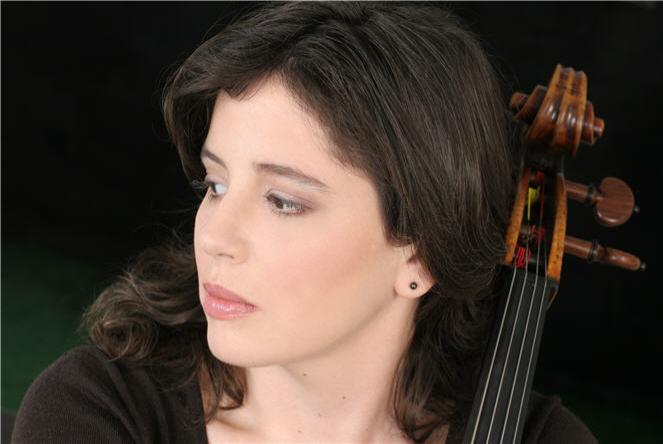Louise Dubin, Cellist in Review
Louise Dubin, Cellist in Review Forgotten Treasures by Franchomme and Chopin John Street Church; New York, NY September 29, 2011Louise Dubin, a fine cellist who studied with Ardith Alton, Aldo Parisot, Timothy Eddy and Janos Starker, based her thesis on Auguste Franchomme (1808-1884). She has just completed her dissertation on the French cellist and romantic composer to fulfill her Doctoral requirements at Indiana University’s School of Music in Bloomington, and she is the school’s first music performance student to receive two grants for doctoral research from the university, which funded the research trip to France where she met descendants of Franchomme and discovered much of the music heard at the concert under review. Franchomme, the most distinguished cellist of the era, is not exactly forgotten, but is best remembered as being the dedicatee of Chopin’s Cello Sonata, Op. 65 and, ergo, the great composer’s dearest friend. Franchomme, of course, left no recorded legacy of his performances, but Ms. Dubin’s research has retrieved Franchomme’s own music, and she has just made a commercial recording for the Eroica Classical label of Franchomme’s music, most of which has never been recorded or published. Moreover, Ms. Dubin’s intense and perceptive work has unearthed clues of Franchomme’s probable performance style by way of his fingerings and bowings, having an impact on sound production and an emotional impact on performance.
The September 29th recital began with two of Franchomme’s own pieces: one of his Caprices, Op. 7 No. 9, a fine specimen undoubtedly inspired by Paganini’s famous 24 Caprices, Op. 1 for solo violin, composed circa 1804 and published in1820. Franchomme obviously owes much to Paganini’s models. But its highly contrapuntal style also harks back to J.S. Bach’s unaccompanied Cello Suites. The Caprice was followed by a vivacious set of Variations on an Irish Air, Op. 25 for Cello and Piano, which commenced with a brief introduction and evolved into the theme itself– dancelike and energetic–and a lively numerous set of variants. Ms. Dubin’s excellent performances–likewise, the aforementioned Caprice–was a joy to savor, and Hiroko Sasaki’s cooperation at the piano worked beautifully as a Duo. (Her little asides and comments added immensely to the performance’s effectiveness.) Likewise, Franchomme’s “Fantaisie on Mozart’s Enchanted Flute,” Op. 49 at the end of the printed program (“The Zauberflote” or “Magic Flute”; Franchomme spent much of his career playing in the pit of the Paris Opera Orchestra at the Theatre Italien and in the court of King Louis Philippe). The Fantaisie interpolates parts of the overture and some of the arias heard in the opera itself. Again, Ms. Dubin and Ms. Sasaki worked beautifully together (and I was surprised to learn that the two protagonists had not previously played together before this concert.)
The rest of the concert, mostly Franchomme’s arrangements of Chopin’s treasures (the Nocturne, Op. 55 No. 1, the Funeral March from the Sonata Op. 35, the Mazurka, Op. 33 No.3, and the Prelude, Op. 28 No. 20), were hardly flattered by Franchomme’s tepid and servile recasting for cello and piano (Op. 55 No.1). Moreover, his recasting for Cello Quartet (of the Op. 35 and Op. 28 No. 20) sorely missed some of the ‘di rigeur’ percussiveness of the original piano, and the Second Ballade, Op. 38 was almost laughable (it turned out to be just the piece’s swaying opening theme.) The Cello Quartet, Ms. Dubin; Katherine Cherbas; Saeunn Thorsteindottir and Sarah Hewitt-Roth, also played Franchomme’s adaptations of Schumann’s “Soldier’s March” (from his Album for the Young) and the Can Can from Offenbach’s “Orpheus in the Underworld.”
On the one hand, Liszt’s audacious genius–like it or not–often imparted a vibrant life to the music of other composers that Franchomme’s more modest gifts simply could not do. But the great violinist Nathan Milstein did fashion a more compelling and interesting arrangement of an early Chopin Nocturne in C-sharp Minor, Op. Posthumous. (Franchomme’s dutiful “arrangements” did nothing at all.) Mendelssohn’s own “Song without Words” for cello and piano was far more palatable for this listener. Ms. Dubin and Ms. Sasaki played it beautifully.
All told, this concert faute de mieux was worthwhile, mostly for the three original Franchomme pieces. And I am eagerly looking forward to Ms. Dubin’s imminent recording.

